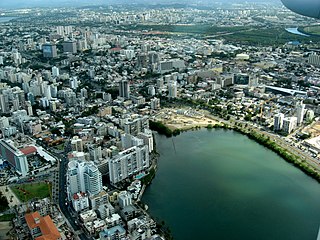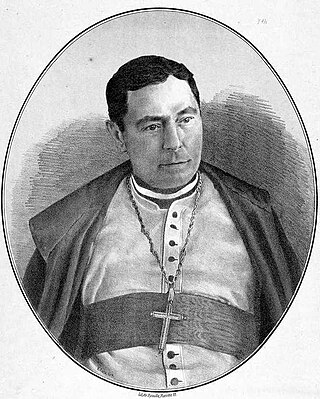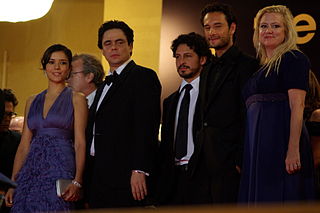
Juan Luis Guerra Seijas is a Dominican musician, singer, composer, and record producer. He has sold 15 million records worldwide, making him one of the best-selling Latin music artists. Throughout his career, he has won numerous awards including 24 Latin Grammy Awards, three Grammy Awards, and one Latin Billboard Music Award. He won 3 Latin Grammy Awards in 2010, including Album of the Year. In 2012, he won the Latin Grammy Award for Producer of the Year.

Foot Ball Club Melgar, known simply as FBC Melgar or Melgar, is a Peruvian professional football club based in Arequipa, Peru. It is one of Peru's oldest football teams, founded in 1915 by a group of football enthusiasts from Arequipa. The club currently plays in the Peruvian Primera División, the top tier of Peruvian football.
Andalusian cuisine is the regional cuisine of Andalusia, Spain. Notable dishes include gazpacho, fried fish, the jamones of Jabugo, Valle de los Pedroches and Trevélez, and the wines of Jerez, particularly sherry. Culinary influences come from the historic Christian, Muslim, and Jewish traditions of the region. The oldest known cookbook of Andalusian cuisine, Kitab al tabij fi-l-Maghrib wa-l-Andalus fi `asr al-Muwahhidin, li-mu'allif mayhul, dates from the 13th century.
Maria Luisa Puga was a Mexican writer. Her 1983 novel Pánico o peligro won the Xavier Villaurrutia Award.

Santurce is a barrio of San Juan. Its population in 2020 was 69,469. It is also the biggest and most populated of all the barrios in the capital city with a bigger population than most municipalities of Puerto Rico and one of the most densely populated areas of the island .

"The pot calling the kettle black" is a proverbial idiom that may be of Spanish origin, of which English versions began to appear in the first half of the 17th century. It means a situation in which somebody accuses someone else of a fault which the accuser shares, and therefore is an example of psychological projection, or hypocrisy. Use of the expression to discredit or deflect a claim of wrongdoing by attacking the originator of the claim for their own similar behaviour is the tu quoque logical fallacy.
Paolo Agazzi Sacchini is an Italian film director. He has resided in Bolivia since 1975. He studied political science and economics in the State University of Milan as well as directing and writing at Superior Institute of Cinematography in Milan. He was born in Motta Baluffi.
José Hernández was a Spanish painter and plastic artist.

Zeferino González y Díaz Tuñón was a Spanish Dominican theologian, and philosopher, Archbishop of Seville and cardinal.

The Milkmaid and Her Pail is a folktale of Aarne-Thompson-Uther type 1430 about interrupted daydreams of wealth and fame. Ancient tales of this type exist in the East but Western variants are not found before the Middle Ages. It was only in the 18th century that the story about the daydreaming milkmaid began to be attributed to Aesop, although it was included in none of the main collections and does not appear in the Perry Index. In more recent times, the fable has been variously treated by artists and set by musicians.

Cristian Mercado is a Bolivian theater and film actor.
White Dominicans are Dominican people of predominant or full European descent. They are 17.8% of the Dominican Republic's population, according to a 2021 survey by the United Nations Population Fund. The majority of white Dominicans have ancestry from the first European settlers to arrive in Hispaniola in 1492 and are descendants of the Spanish and Portuguese who settled in the island during colonial times, as well as the French who settled in the 17th and 18th centuries. Many whites in the Dominican Republic also descend from Italians, Dutchmen, Germans, Hungarians, Scandinavians, Americans and other nationalities who have migrated between the 19th and 20th centuries. About 9.2% of the Dominican population claims a European immigrant background, according to the 2021 Fondo de Población de las Naciones Unidas survey.
Carles Mas Bacardit is a Spanish professional footballer who plays as a centre-back for Olot.

TechnoCalyps is a 2006 Belgian transhumanism documentary film written and directed by Frank Theys. It explores the advance of technology.

Dolors Bassa i Coll is an educator, psychopedagogist and Spanish politician from Catalonia who held the position of Minister of Labour, Social Affairs and Families in the Generalitat de Catalunya until Spain dismissed the Catalan government on 27 October 2017. She is known for her syndicalist career in the major Spanish trade union, Unión General de Trabajadores. Since March 2018 she was remanded in custody, without bail, by order of the Supreme Court of Spain, accused of sedition and rebellion. She was sentenced on October 14, 2019, to 12 years in prison for sedition, as being responsible for devoting several thousand public schools as polling stations in the 1 October 2017 referendum. She was freed in June 2021 following a government pardon.
Olin Pierre Louis is a Haitian Roman Catholic priest in San Juan, Puerto Rico. Louis was named the parish priest of la iglesia Nuestra Señora de la Providencia in San Juan by Roberto González Nieves, the leader of the Roman Catholic Church in Puerto Rico. Pierre Louis is known for providing support and advocating for Haitian and Dominican immigrants in Puerto Rico.
Edgar Smith is a Dominican author and poet born in Villa Consuelo, a neighborhood in the capital city of Santo Domingo. He is the eldest child of Juana I. Fernández and Ramón Smith, a member of the International Taekwon-Do Federation Hall of Fame. He is a poet, writer, editor and translator, who runs his own small publishing company, Books & Smith, in New York City, where he has resided since 2010.

When have we eaten from the same dish? is a Spanish idiom about someone who has "taken too many liberties" and caused irritation or offense. It is usually made as hierarchical social commentary about poor manners or incivility, said to someone perceived to be acting above their social standing, position, class or rank. It is also used as a statement, When we have eaten from the same dish.

The Fathers is a conceptual and performative work of critical and biographical content by artist Abel Azcona. The Fathers was first performed in 2016 in Madrid with the final performance, also in Madrid, in 2017 in an exhibition format. The durational piece included dozens of female survivors of prostitution who gave a physical description of their last client. On the other side of a ten-meter-long table, composite artists listened to them and drew images of the clients. The performance generated dozens of portraits which, at the closing of the work in 2017, were exhibited with the premise that any of them could be Azcona's father. The biographical work creates a critical discourse with prostitution and its inheritance, and in the case of Azcona himself, of an unknown father, having been conceived during an act of prostitution.
Abel Azcona, the son of a prostituted woman who is looking for his whoremonger father, because it perfectly summarizes everything that the patriarchy has built on their subordination and for our autonomy. Abel represents the aching son of an unknown father. All of us are those men who walk on their backs. To those who do not see their faces until the end. Those parents who sign unwritten covenants and who leave their semen springs across the planet. Those who rent vaginas, wombs, and maids. It is urgent to face those who prefer to remain installed in comfort. Only in this way will it be possible to turn our face towards the camera, without fear of being recognized in a robot portrait of a whoremonger father. Without fear of the mirror returning the image of a monster.
Alberto Gallego Laencuentra is a Spanish retired footballer who played as a midfielder, and the manager of SCR Peña Deportiva.











